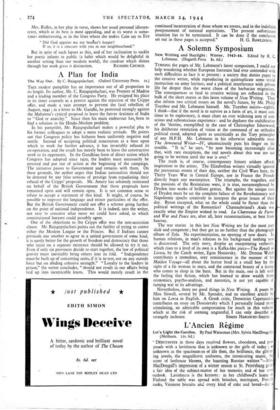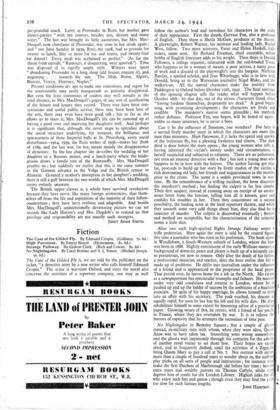L'Ancien Regime _ " DtsurasrrEs in those days received flowers,
chocolates, and pro- posals with a lavishness that is unknown to the girls of today ; unknown as the spaciousness of life then, the brilliance, the glitter- ing jewels, the magnificent uniforms, the intoxicating music, the scent of hothouse blooms, the haunting Russian waltzes "—Mrs MacDougall's impression of a winter season at St. Petersburg. give' a fair idea of the subject-matter of her memoirs and of her own outlook. Lavishness is the keynote: in her childhood's home in Finland the table was spread with brioches, meringues, French rusks, Viennese biscuits and every kind of cake and bread—for 3
pre-prandial snack. Later, at Provender in Kent, her mother gave dinner-parties " with ten courses, besides ices, dessert and many wines." The last war brought its little austerities, but Mrs. Mac- Dougall, now chatelaine of Provender, was soon in her stride again ; and " one June Sunday in x939, Rose, my cook, had to provide for twenty to lunch, fifty or more for tea and tennis, and twenty-four for dinned Every meal was acclaimed as perfect." (As for the threat from outside, " Rumours, if disquieting, were ignored.") Time was disposed of in equally ample style. Winters were spent " abandoning Provender to a long sleep (old houses require it), and migrating . . . towards the sun. The Midi, Rome, Algiers, Biarritz, Venice, Florence, Naples."
Present conditions are apt to make one censorious, and regret for the unattainable may easily masquerade as patriotic disapproval. But even the least censorious of readers may well wonder at the total absence, in Mrs. MacDougall's pages, of any sort of justification of the leisure and luxury they record. There may have been con- scientious and useful public service, there may have been love of the arts, there may even have been good talk ; but as far as she allows us to share it, Mrs. MacDougall's life can be summed up as having a good time and marrying her daughters well. And perhaps it is significant that, although she never stops to speculate about the social structure underlying, for instance, the brilliance and spaciousness of those Imperial balls at St. Petersburg, every social disturbance-19i4, 1939, the Paris strikes of 1936—makes her think of 1789, and the last war, for her, meant mainly' the disappearance of dynasties. In the last chapter she describes the wedding of her daughter to a Russian prince, and a lunch-party where the bride- groom draws a family tree of the Romanoffs. Mrs. MacDougall prattles on ; but suddenly we realise that this is the same summer as the German advance to the Volga and the British retreat to Alamein. Granted a mother's absorption in her daughter's wedding, there is still a gulf between the two worlds of which Mrs. MacDougall seems entirely unaware. The British upper classes as a whole have survived revolutions because they have never, like many foreign aristocracies, shut them- selves off from the life and aspirations of the majority of their fellow- countrymen ; they have been resilient and adaptable. And beside Mrs. MacDougall's unintentionally devastating picture we can set records like Lady Homer's and Mrs. Dugdale's to remind us that privilege and responsibility are not usually such strangers.
JANET ADAM SMITH.



























 Previous page
Previous page